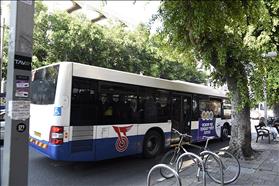What should be the epitome of Israel’s Jewish character?
Will the municipal revolution become a national revolution?
This month, a historic makeover is underway in the arena of public transport on Shabbat, originating from the initiative of a number of mayors in Gush Dan, the most prominent of which is Ron Huldai, the mayor of Tel Aviv.
07/11/2019 21:07
Tags: public transport · public transportation · Tel Aviv · Shabbat

Dan Bus, source: Wikipedia
An issue that has frequently been raised in recent polls in Israel is the issue of the lack of public transport on Saturdays. This month, a historic makeover is underway in this arena, originating from the initiative of a number of mayors in Gush Dan, the most prominent of which is Ron Huldai, the mayor of Tel Aviv. This is after a number of civil initiatives in different places throughout the country, including Jerusalem, that operate on a limited scale and find it difficult to secure funding due to legal restrictions on operating public transport without a license from the Minister of Transportation. The Minister of Transportation, of course, refuses to allow public transportation on Saturdays.
On the other hand, it is clear from recent Hiddush surveys and similar surveys conducted over the years that support for making public transport available on Saturdays is very broad, enjoying the support of some 70% of the adult Jewish public. It includes even a considerable percentage of the Zionist Orthodox public that believes in "live and let live." Moreover, in the recent polls published by Hiddush since January, it is clear that this issue is one of the electorate’s highest priorities; and, not coincidentally, the Blue & White party actually spelled this election promises out in its campaign on religious and state relations.
The revolution is due this month. On Tuesday night, the Tel Aviv-Jaffa Municipal Authority approved a NIS 1.5 million budget for the operation of an intercity minibus service involving seven separate lines, which would travel between, and through, Tel Aviv-Jaffa, Givatayim, Kiryat Ono, and Ramat Hasharon. A spokesperson for the Tel Aviv-Jaffa municipality said the network would being operations “in the coming weeks.” The participating municipalities said the service would initially be free, indicating that a permanent service may involve payment. In order not to come under the legal definition of public transport it is essential that the service not collect money from passengers when they board the ride.
It seems that prohibiting the weakest elements of society from having public transportation on Shabbat is the epitome of Israel’s Jewish character
The reactions from the ultra-Orthodox and Zionist ultra-Orthodox camps were predictable. They announced that they were organizing to prevent the initiative, and MK Rabbi Moshe Gaffney (UTJ), Chairman of the powerful Knesset Finance Committee called this "a Disaster of national magnitude" and "a betrayal of the state." He sees Israel "losing its Jewish character," for it seems that prohibiting the weakest elements of society from having public transportation on Shabbat is the epitome of Israel’s Jewish character and not, unfortunately, what will soon be read in this week's Torah portion, as an explanation of God for choosing Abraham:
“For I have chosen him, that he may command his children and his household after him to keep the way of God by doing righteousness and justice, that God may bring unto Abraham what he hath promised him.” [Genesis 18:19]
The revolution is a pioneering initiative in the municipal arena, in which mayors are directly elected by their constituents and heed their preferences. As we have had occasion to underscore all too often, in the national arena politicians on both the right and left prefer to turn their backs on their constituents, particularly on matters of religion and state. They ignore their voters, trading away individual freedoms, human dignity, and freedom of choice for the votes of the ultra-Orthodox parties, which aspire to establish a state ruled by religious law and weaken the democratic character of the State of Israel.
We are facing a rare window of opportunity in Israel today. A government coalition may be formed which does not depend on the votes of the religious parties, which could strengthen the civil character of the state and breathe life into the Declaration of Independence’s promises of "freedom of religion and conscience" and "equality regardless of religion." No doubt this is what the public wants, as Hiddush’s recent surveys show, but this challenge still faces the civil political parties, first and foremost among them – Blue & White and Yisrael Beiteinu. Will they remain loyal to their constituents and bring the hoped for revolution to the national arena too? Hiddush will continue to battle to achieve this critical goal, and hopefully many more voices will be heard during this challenging period.